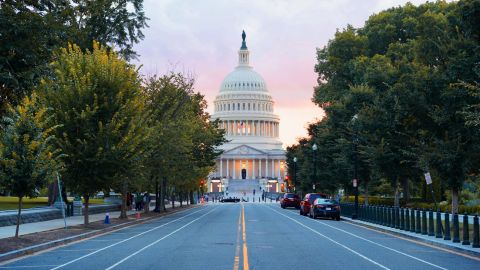ASBMB asks lawmakers to support science in U.S. competition bill
The American Society for Biochemistry and Molecular Biology issued a statement earlier this month in support of increasing federal investments in science, protections for basic science research, and policies that support and diversify the U.S. science, technology, engineering and math workforce.
On Feb. 4, the U.S. House passed the America COMPETES Act of 2022 in response to the Senate’s version, the United States Innovation and Competition Act of 2021, which passed in June. A yet-to-be-established conference committee must now negotiate the differences between COMPETES and USICA into a unified bill.
The ASBMB recommended several provisions that, if retained, would make significant strides in providing the monetary and workforce resources necessary for the nation to maintain its global leadership in research.
“As research-and-development performance shifts away from the United States, we urge members of the conference committee to work swiftly to pass this important legislation,” the society wrote.
Both USICA and COMPETES authorize significant funding increases for the National Science Foundation, the Department of Energy and the National Institute of Standards and Technology. The society commended Congress’ bipartisan commitment to strong and sustained investments in these federal agencies that play critical roles in the scientific research ecosystem.
The ASBMB also called attention to a critical provision for attracting and retaining international talent, Sec. 80303 of the COMPETES Act. If retained in the final legislation, foreign-born STEM Ph.D. recipients (a critical population of the doctoral U.S. STEM workforce) would be exempt from numerical caps on U.S. green cards, removing a significant barrier that often prevents international Ph.D.s from staying in the U.S. after completing their research training.
The society also backed several provisions in the bills that address systemic barriers faced by the next generation of research scientists, including the STEM Opportunities Act (H.R. 204), the Rural STEM Education Research Act (H.R. 210), the MSI STEM Achievement Act (H.R. 2027), the Combatting Sexual Harassment in STEM Act (H.R. 2695), and Sec. 10304 of the NSF for the Future Act (H.R. 2225). If passed, these will make a significant impact to support scientists from historically marginalized backgrounds in their pursuit of STEM careers.
The Association of Public and Land-grant Universities also shared its support for the legislation but requested that lawmakers translate the proposed authorizations for federal agencies into actual appropriations: “(A) strong authorization bill is no replacement for a plan to deliver on needed funding. We urge Congress to deliver on both.”
This week, several senators reinforced the notion that investments must be made across the entire U.S. innovation system, including basic and applied research at the DOE. The ASBMB supports this effort, because, the society noted in its statement, it would “fund repairs and modern upgrades for laboratories, administrative buildings and other critical infrastructure” at the DOE’s 17 national laboratories, which provide scientists across the nation with access to cutting-edge equipment.
U.S. Sen. Todd Young, R-Ind., the lead Republican sponsor of the Endless Frontier Act within USICA, told the Bipartisan Policy Center: “We are falling behind in certain areas of technology development. We will fall behind in other areas if our leaders do not begin investing more in innovation, basic research and some areas, applied research in other areas, and harnessing the talent of many of our entrepreneurs, innovators, investors and researchers around the United States.”
U.S. Sen. Dick Durbin, D-Ill., asked his colleagues in a statement to “stand up for American workers and American values” by quickly negotiating the different language between COMPETES and USICA.” He emphasized that the legislation would “boost U.S competitiveness with China and help reindustrialize America, make investments in manufacturing and research, provide seed money to create good, new jobs.”
National polling data from earlier this month showed a strong majority of voters support the America COMPETES Act. The study, however, found that Americans are more compelled by the legislation’s ability to create new jobs than the potential to increase global competitiveness.
Read the ASBMB’s full comments here.
Enjoy reading ASBMB Today?
Become a member to receive the print edition four times a year and the digital edition monthly.
Learn moreGet the latest from ASBMB Today
Enter your email address, and we’ll send you a weekly email with recent articles, interviews and more.
Latest in Policy
Policy highlights or most popular articles

Councilors advocate for science on Capitol Hill
ASBMB Councilors meet with their elected officials to advocate for basic scientific research funding and training the next generation of scientists.

Hope for a cure hangs on research
Amid drastic proposed cuts to biomedical research, rare disease families like Hailey Adkisson’s fight for survival and hope. Without funding, science can’t “catch up” to help the patients who need it most.

Supporting science through advocacy and community building
ASBMB calls on scientists to take action as funding cuts and policy shifts threaten the U.S. research enterprise, emphasizing the power of community advocacy and persistence in protecting the future of science.

Seven steps to advocating in your home state
Find out how to schedule, prepare for and conduct a productive district office meeting to communicate the importance of fundamental scientific research funding to your representatives.

ASBMB members call for funding and agency support amidst uncertainty
In 60 meetings on Capitol Hill, scientists urge legislators to reaffirm support for scientific innovation

Embrace your neurodivergence and flourish in college
This guide offers practical advice on setting yourself up for success — learn how to leverage campus resources, work with professors and embrace your strengths.

